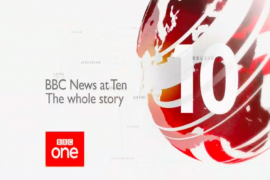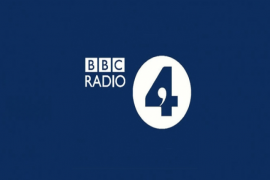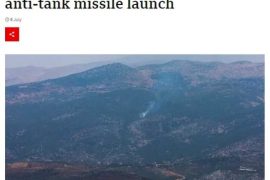1) At the Washington Examiner CAMERA’s Sean Durns takes a look at “Hezbollah’s media relations department“.
“Hezbollah is nothing if not image-conscious. As one operative, Sheik Nabil Qaouk, told The New York Times in July 2000, “The use of the media as a weapon” has “an effect parallel to a battle.” In this respect, Hezbollah is well armed.
The group operates its own TV channel, Al Manar (The Beacon), which routinely broadcasts calls for “Death to America,” age-old antisemitic tropes and hate speech, and promises of the impending destruction of the Jewish state. In 2006, Al Manar was labeled a Specially Designated Global Terrorist Entity, along with other Hezbollah-linked mouthpieces such as the Lebanese Media Group and Radio al-Nour. In its statement announcing this designation, the U.S. Treasury Department noted that an Al Manar employee had used his position to engage in “preoperational surveillance” on behalf of Hezbollah.”
2) At the INSS, Gideon Sa’ar and Ron Tira analyse “the political and military contours of a future conflict between Israel and Hezbollah”.
“It is impossible to assess the distinct context of the next conflict with Hezbollah, but a look at the recent past reveals the rapid changes in the contexts with potential for escalation: from Hezbollah’s force buildup by means of supply lines passing through Syria, to its force buildup on Lebanese soil (including the manufacture of high quality weapons), to efforts by Hezbollah and Iran to expand their force deployments in Syria. There are changes in context as to Russian indifference vs. reservations about actions attributed to Israel, and apathy vs. aggressiveness by the Syrian regime toward reports of breaches of Syrian sovereignty by Israel. The context is affected by the changes in the self confidence and boldness of members of the “axis” (Iran, Hezbollah, and their allies), and the degree to which the axis is invested in other fronts and is not interested, or for that matter, free to seek, an additional front with Israel. It is also affected by changes in the international legitimacy of the Alawite regime, Hezbollah, and Iran, inter alia as a result of the unfolding of Syria’s civil war and developments regarding the Iranian nuclear project.”
3) BBC reporting on the ‘hunger strike’ by some Palestinian prisoners earlier this year included a brief description of its instigator Marwan Barghouti as “a Palestinian leader jailed by Israel for life for five murders” who “has been touted as a possible future successor to Palestinian Authority President Mahmoud Abbas”. The ITIC has compiled a detailed profile of Marwan Barghouti.
“During Barghouti’s imprisonment in Israel, his wife Fadwa Barghouti began and headed the campaign for his release. Fadwa is a lawyer who lives in Ramallah, and owns a private legal practice. She is also a member of the Fatah Revolutionary Council. Fadwa heads a fund financed by the PA. The fund runs a Palestinian and international campaign to exert pressure on Israel to release Barghouti. The campaign cultivates the myth of a “freedom fighter,” presenting Barghouti as the “Palestinian Nelson Mandela.”
The campaign for the release of Barghouti was launched in 2013 in Nelson Mandela’s cell on Robben Island, the jail where the leaders of resistance to the apartheid regime were incarcerated. The call for the release of Barghouti was signed by eight Nobel Prize laureates, including former American President Jimmy Carter and Archbishop Desmond Tutu. Fadwa often travels around the world and meets with various leaders.”
4) The JCPA has a backgrounder on a subject long under-reported by the BBC: Mohammad Dahlan’s collaboration with Hamas and Egypt.
“The tripartite axis of Egypt-Hamas-Dahlan constitutes a convergence of interests between the three sides. Although contingent, it could continue for a long period. […]
As the understandings between the three sides are carried out, the humanitarian situation in Gaza is expected to improve. Egypt will increase its influence in the Strip; the UAE will gradually assume a presence there and push Qatar out.
The augmenting of Egypt’s status vis-à-vis Hamas will enable it to be the main mediator between Israel and Hamas on all the issues, including a new prisoner-exchange deal.
The main loser is Abbas, who has been trying in every possible way to subvert these understandings and to reconcile with Hamas so as to neutralize Dahlan, but meanwhile with no success.”




